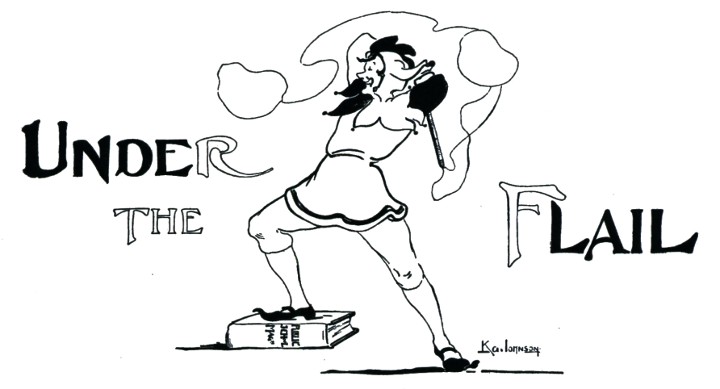
Public School Magazine, January 1901
A correspondent writes commending the verse by Mr. Rennell Rodd, quoted in the account of the Hitchin field-day last month. He asks me whether I do not agree with him that “every schoolboy” ought to take it to heart. It certainly does seem another case where to spare the Rodd would be to spoil the child.
A slight panic was caused at Malvern recently by the fact that the ventilation had been so improved that it could no longer act as a perennial grievance. Matters were, however, soon set right again by a genius who discovered that several of the doors in the building were hollow frauds, and led nowhere. This grievance is considered by experts as good as, or even superior to, its predecessor. The College architect would appear to have been something of a wag.
At an interesting debate on the subject of Progress, a Rugby orator backed up his opinion that England had not progressed since the days of Elizabeth by observing that our ancestors could light their candles with ease and a blameless conscience, alluding, of course, to the fact that in these degenerate days we are obliged to substitute matches. But, after all, ’tis idle to repine. Let us boldly face the inevitable, and, instead of ease, use fusees.
(Stop-press note: A harassing doubt occurs to me that you cannot light candles with fusees. I have never tried myself. Perhaps some gentle reader will make the attempt and let me know the result. Anyhow, failure will be but another proof of our degeneracy. Indeed yes.)
A Dulwich correspondent sends me the following extract from “Home Whispers”—his favourite paper.
“At Dulwich College, where there are over seven hundred boys, the Head Master, Mr. A. H. Jilks, who is an untiring worker, sets his face sternly against smoking by any of the boys, even though they may be of the Upper Sixth, and all of them understand that cigarette-smoking is very harmful and very injurious, and would not dream of indulging in it. Similar testimony is borne by the masters and mistresses of the London School Board.”
He wishes me to turn a blind eye to the polished beauty of the author’s style, and say whether the paragraph would not gain in point if the Head Master of Dulwich were really Mr. Jilks, if there were really an Upper Sixth, if, in short, the author knew what he was talking about. I am sorry to say that the grace of the passage has taken too strong a hold on me to allow of criticism and analysis. There are higher things than truth, and a finished style is one of them.
A Haileyburian tells me that he attended a lecture on Microbes at Haileybury the other day, and has not been feeling really well since. One of the remarks that struck him particularly was this, that under ordinary circumstances men are not subject to swine-fever. He encloses a stamp with his letter, and demands instant information as to what the circumstances are that can give a man swine-fever. They must, he says, be somewhat pigculiar. After such a degrading remark I refuse to fling wide the gates of the bonded warehouse of my knowledge, and, as a significant proof of my feelings, I have kept the stamp.
The Felsted Games Committee met a short time ago to decide whether to continue to use the present football shirt or to choose a new one. They determined to get a new one. But why stop at this? Why this parsimony? It will prove a far better policy to take the bull by the horns and buy several of the necessary garments, one apiece, in fact. Sooner than see Felsted reduced to a single shirt, I will pay the bill myself, though it crush me.
When a friend of mine informed me that he had been a spectator of the Winchester v. Old Wykehamists’ match, and said that McDonnell busted off well, I was, for the moment, inconsolable. I cheered up again, however, on learning that this explosion is merely a part of the Winchester game, and that the obituary poem, which was rapidly taking shape on my cuff, would not be needed.
A Carthusian complains of an escape of gas in Hall. Yes, I knew you would make some foolish remark of the sort, but that is not the reason. The Debating Society have not met in the Hall lately.
A Westminster orator has been dilating on the happy time spent by the Boers at St. Helena. If the misguided Doppers still fighting get wind of this, we may expect to see them lining up in long queues overnight so as to ensure themselves good places in the prison. I can also imagine (I have a strong imagination) the governor of St. Helena sending out advertisements to De Wet and others, offering all the comforts of a home in exchange for services.
“De Wet, I must point out to you,
To camp in open air at night is
A certain way to catch the Flu.,
And sow the seeds of bad bronchitis.
Your place at St. Helena waits,
Do look us up, my dear old chappie,
For once inside our prison-gates,
You will, I know, be really happy.”
Jack Point.
 Madame Eulalie’s Rare Plums
Madame Eulalie’s Rare Plums